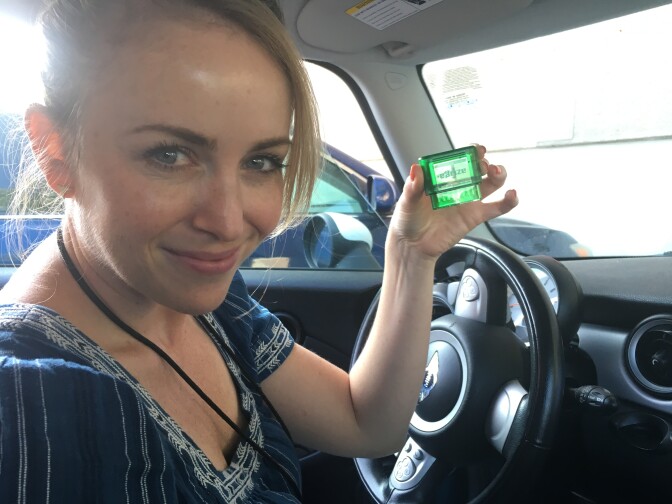This story is free to read because readers choose to support LAist. If you find value in independent local reporting, make a donation to power our newsroom today.
This archival content was originally written for and published on KPCC.org. Keep in mind that links and images may no longer work — and references may be outdated.
Caltrans road charge pilot app helps drivers, raises privacy concerns
I've been testing out some new car technology as part of a Caltrans pilot program that could change the way Californians pay for street repairs.
The gas tax that we pay at the pumps hasn’t been generating enough revenue, so the state is piloting a new approach to charge drivers by the mile. To do that, they’ve got to track how much we drive.
Since July, I've had a small device plugged into my car’s computer through the On-Board Diagnostic port — a device that collects a lot of information.
"We don’t just collect miles, we also offer what we call value-added services," said Nate Bryer, vice president for innovations at Azuga, the company that makes my device and the app that goes with it.
Beyond telling me how much I would be billed if the road charge program were in effect, the app shows me all kinds of data about my car and how I’ve been driving.
Apparently, I brake too hard.
And when I drive less than a mile, I proudly earn the "I Could Have Walked Badge" – or when I drive after midnight – the "Pumpkin Badge."

"The term is called gamification. We’ve gamified the collection of data," Bryer said.
Bryer points out it's not all for fun. The app will also tell you useful information, like how much charge you’ve got left in your battery or if your engine needs maintenance.
Azuga is not alone in developing these tools. More than a dozen companies, including data giants Verizon and AT&T, are marketing the OBD II monitoring devices. They can do everything from transmit Wi-Fi to track your teenage daughter or call emergency services in case of an accident.
Market analyst Roger Lanctot with Strategy Analytics said while the market for the devices has expanded, the appeal of the systems is limited. Many people don't know where their OBD port is and many more object to the potential privacy intrusion.
"Those devices, they can extract a whole lot of data. The door is open if you’ve connected that device to the vehicle," he said.
Azuga’s Bryer argues his company's app is no different than many others we already use on our smart phones – including Uber or Waze, which also track and collect data about users.
"From a tracking perspective you're like, 'Well, I don’t want to be tracked, unless it’s to my benefit.' And so our goal is to create a connected platform that actually benefits consumers," he said.
Byer assures road charge pilot drivers that their data won't be shared with anyone unless they give express permission. And any sharing, he said, would be tied to some benefit, like offers for cheaper insurance or competitive bids on car maintenance. Currently, California law does not allow insurance companies to set rates based on driving performance, although mileage-based insurance is allowed.
As for the state’s access to the information collected by the devices, he said officials won’t see any of the data except for the mileage numbers.
In Oregon, the first state to officially launch a road charge program, state law prevents officials from collecting any data beyond the number of miles given and requires they purge all that data every 30 days.
In California, wary pilot drivers can opt for a more low-tech option — such as taking a cell phone picture of their odometer. But then they’ll miss out on their "Snail Badge" for excess idling in LA. traffic.









